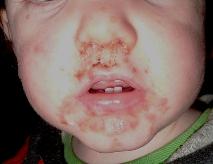What are the symptoms?
 Can vary from no symptoms at all or only very mild symptoms. Possible symptoms include blisters that start as small red dots which later become ulcers. Blisters appear inside the cheeks, gums, and on the sides of the tongue, around the mouth and as well as on the hands and feet. In infants, sometimes blisters can be seen in the nappy area. Children can sometimes have a low fever, sore throat, tiredness, feel off colour and may be off their food for a day or two. Very rarely, is there an effect on the heart, brain, lining of the brain (meningitis), lungs, or eyes.
Can vary from no symptoms at all or only very mild symptoms. Possible symptoms include blisters that start as small red dots which later become ulcers. Blisters appear inside the cheeks, gums, and on the sides of the tongue, around the mouth and as well as on the hands and feet. In infants, sometimes blisters can be seen in the nappy area. Children can sometimes have a low fever, sore throat, tiredness, feel off colour and may be off their food for a day or two. Very rarely, is there an effect on the heart, brain, lining of the brain (meningitis), lungs, or eyes.
How is it spread?
 Hand, foot and mouth disease is usually spread by person-to-person contact. The virus is spread from the faeces of an infected person to the mouth of the next person by contaminated hands. It is also spread by secretions from the mouth or respiratory system, and by direct contact with the fluid from blisters.
Hand, foot and mouth disease is usually spread by person-to-person contact. The virus is spread from the faeces of an infected person to the mouth of the next person by contaminated hands. It is also spread by secretions from the mouth or respiratory system, and by direct contact with the fluid from blisters.
It usually takes between three and five days after contact with an infected person before blisters appear. The virus can remain in faeces for several weeks.How is it spread?
Is there risk to my pregnancy?
 The viruses that cause hand, foot and mouth disease are common and adults including pregnant women are often exposed to them without symptoms. Most infections during pregnancy cause mild or no illness in the mother.
The viruses that cause hand, foot and mouth disease are common and adults including pregnant women are often exposed to them without symptoms. Most infections during pregnancy cause mild or no illness in the mother.
There is no clear evidence that maternal infection causes adverse outcomes of pregnancy, such as abortion, stillbirth, or congenital defects. However, mothers infected shortly before delivery may pass the virus to the newborn. Babies born to mothers who have symptoms of enteroviral illness around the time of delivery are more likely to be infected. Most newborns infected with an enterovirus have mild illness, but, in rare cases, they may develop an overwhelming infection of many organs, including liver and heart, and die from the infection. The risk of this severe illness in newborns is higher during the first two weeks of life.
How can it be prevented?
- Good hygiene is the best protection: wash hands with soap and water after going to the toilet, before eating, after wiping noses, and after changing nappies or soiled clothing. Disposable gloves when changing nappies is a good idea.
- Avoid sharing cups, eating utensils, items of personal hygiene (for example towels, washers and toothbrushes), and clothing (especially shoes and socks).
- Thoroughly wash any soiled clothing.
- Ensure the mouth and nose are covered when coughing and sneezing. Wipe the nose and mouth with tissues, dispose of used tissues and then wash your hands.
- With consideration that the virus can be faeces for several weeks after the rash had gone, take ongoing extra precautions with dirty nappies.
- Please stay away from infected children if you are pregnant (especially in advanced pregnancy) and especially keep any toddlers you have away from infected children. Remember the virus can be in faeces after the rash goes. My grandson Toby contracted hand, foot and mouth at “music time” from another toddler. The infected toddler’s mother said when she arrived “It’s ok. He doesn’t have any blisters now and is no longer infective”. The problem was my daughter was 39 weeks pregnant at the time Toby became infected. All worked out but it caused major issues at the time and Toby had to be kept away from his new brother after birth, All unnecessary and all because of a casual other mother!

How is it diagnosed?
The doctor can diagnose hand, foot and mouth disease based on the symptoms. Laboratory tests are not usually necessary.
How is it treated?
Usually no treatment is needed. Paracetamol will relieve fever and discomfort. Do not give children aspirin. If the headache is severe, or if fever persists, consult a doctor.

